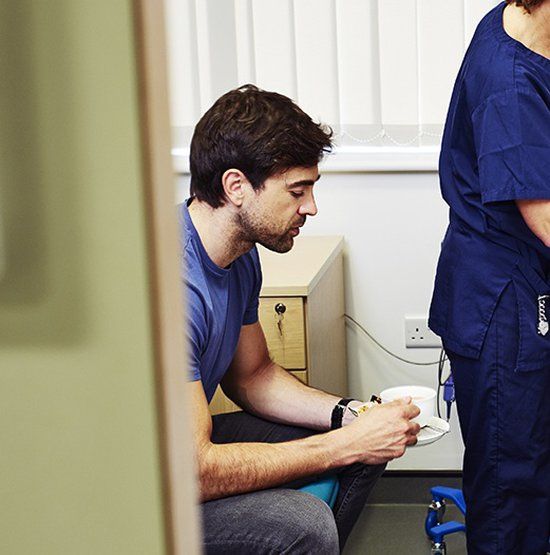
Are you worried about fertility issues or do you already know that you might need male fertility help and treatment?
Here’s a useful Q&A with our male fertility specialist Dr Muhammad Ahsan Akhtar, all about his expertise, sperm tests and treatment and how Manchester Fertility can help you.
Dr Akhtar specialises in male fertility, andis one of the few doctors in the UK to specialise in Andrology – the diagnosis and treatment of male reproductive diseases and sperm-related problems.
He plans treatment for men who have a range of common sperm concerns, from low sperm count to abnormally-shaped sperm.
Why did you choose to specialise in male fertility?
Male fertility is something I’m very passionate about. Male factor fertility issues are so very common and a lot of men aren’t aware of their fertility health and the important role that lifestyle plays in creating good sperm.
I very much want to help change that, by ensuring men can access the right advice, guidance and support and treatment.
How do you best support men who come to you for help to conceive?
With compassionate care, expertise and personalised treatment. I’ve helped men with all types of fertility concerns, so I completely understand how you may be feeling. I’m here to reassure you. There’s so much we can do nowadays for male fertility, to give you the best chance of a baby.
Do all the men that see you need fertility treatment? Or can lifestyle changes help first?
Some men need fertility treatment, others may be able to improve their sperm health with simple lifestyle changes. What you eat, whether you smoke, how much you drink and your lifestyle really do matter when it comes to your fertility.
The good news is that new sperm is made every three months – so lifestyle changes may help to improve your sperm fairly quickly. Whether we advise making these changes or to have treatment all depends on what your semen analysis results reveal.
What exactly is a semen analysis?
A semen analysis is another term for a sperm check. It’s an in-depth look at your sperm in our laboratory, so we can see what your current sperm health is. You just give us a sample of your sperm at our clinic and we then assess it under a high-powered microscope. We’ll check your sperm count, how well your sperm moves, sperm shape – all the important factors that can affect your sperm’s ability to fertilise an egg. You’ll then get a report that tells you all about your sperm.
When would you advise having a semen analysis?
A semen analysis is a very good option to consider if you’ve not conceived yet and have been trying for a baby for some time. Male factor fertility is the cause for around half of couples who are having difficulty achieving pregnancy.
But it’s also a good idea to have your sperm checked even if you’re not planning a baby just yet. Being educated about your fertility health means you can help prevent lifestyle factor fertility issues in future.
What’s the most common treatment for male fertility and how does it work?
A treatment called ICSI is usually advised in most cases. It’s a slight variation of IVF in that instead of mixing eggs and sperm together, we select and prepare the healthy sperm from your sample and inject each egg with a single sperm for fertilisation.
This overcomes many common concerns like low sperm count, slow moving sperm or sperm that can’t penetrate the egg due to shape. For more significant sperm issues, there are surgical options too.
What advice would you give to a man who’s worried about his sperm or ability to conceive?
Don’t be embarrassed or afraid to get help, and don’t wait too long to get help. So many men have fertility concerns but just don’t talk about it. If help is sought early, it could prevent future issues. Treatment and support are available. Just call our team or go online to make an enquiry and we’ll do the rest.
Book a semen analysis or a consultation with Dr Muhammad Ahsan Akhtar
If you’d like to see Dr Akhtar, or want to book a semen analysis or a couples Fertility Assessment, there’s no waiting list. Call our New Patient Co-ordinators on 0161 300 2737 or request an appointment online here.
Last updated: 28th November 2019








